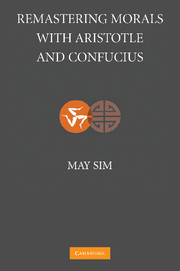Book contents
- Frontmatter
- Contents
- Acknowledgments
- Abbreviations
- Introduction
- 1 Aristotle in the Reconstruction of Confucian Ethics
- 2 Categories and Commensurability in Confucius and Aristotle: A Response to MacIntyre
- 3 Ritual and Realism in Early Chinese Science
- 4 Harmony and the Mean in the Nicomachean Ethics and the Zhongyong
- 5 The Moral Self in Confucius and Aristotle
- 6 Virtue-Oriented Politics: Confucius and Aristotle
- 7 Making Friends with Confucius and Aristotle
- Glossary of Chinese Terms
- Name Index
- Subject Index
1 - Aristotle in the Reconstruction of Confucian Ethics
Published online by Cambridge University Press: 18 July 2009
- Frontmatter
- Contents
- Acknowledgments
- Abbreviations
- Introduction
- 1 Aristotle in the Reconstruction of Confucian Ethics
- 2 Categories and Commensurability in Confucius and Aristotle: A Response to MacIntyre
- 3 Ritual and Realism in Early Chinese Science
- 4 Harmony and the Mean in the Nicomachean Ethics and the Zhongyong
- 5 The Moral Self in Confucius and Aristotle
- 6 Virtue-Oriented Politics: Confucius and Aristotle
- 7 Making Friends with Confucius and Aristotle
- Glossary of Chinese Terms
- Name Index
- Subject Index
Summary
In almost two decades of renewed interest in Confucianism, scholars such as Hall and Ames, Heiner Roetz, and Cheng Chung-ying have appealed to Western figures to help reconstruct Confucian thinking. Following this well-traveled way, I wish to argue in this book that the alliance of Confucius with Aristotle is particularly fruitful.
To talk of the good life is to talk about the kind of person one should become. Aristotle and Confucius both pursue the question of the good life, and both recognize that the question of what kind of person is happy is a question that admits a fairly definite sort of answer. Moreover, the answer of these two quite disparate masters is strikingly similar: the happy life is the life of exemplary virtue. Both thinkers emphasize virtue and the significance of exemplary individuals for training in virtue and the dependence of such training on the right sort of social-political context. Aristotle calls the person of exemplary moral virtue the phronimos; Confucius calls him the junzi. Of course, Aristotle and Confucius hardly agree on every point, and Aristotle's phronimos and Confucius' junzi present different portraits of the living moral paradigm. It is important to notice the similarities and differences and to ask which claims are genuinely normative and which are due to cultural bias. My task in all this is normatively moral as well as scholarly and comparative: I wish to ask who is right about significant ethical issues and what resources each tradition can provide where no answer is extant.
- Type
- Chapter
- Information
- Remastering Morals with Aristotle and Confucius , pp. 23 - 48Publisher: Cambridge University PressPrint publication year: 2007

